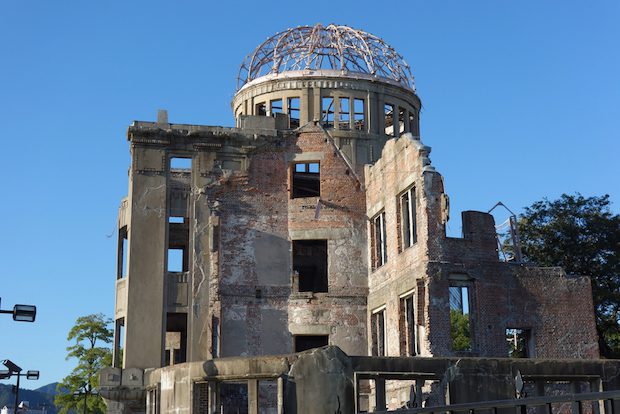Hashimoto: No Apology Needed For Hiroshima

My friend and former Dallas Morning News colleague Mike Hashimoto, the world’s only Japanese-American redneck, reflected recently on President Obama’s planned visit to Hiroshima, which happened earlier today. Excerpt:
Hiroshima was one of the pivotal events to end a war that needed ending. Without it, more Japanese would have died in a U.S. assault on the islands, as would have tens of thousands of Americans. People die in wars, and wishing it weren’t so doesn’t make it so.
If it took a step as extreme as an atomic weapon to convince those obsessed fellows running Japan that surrender was the superior option, then it did. No apology needed for sparing lives on both sides, and I’m relieved Obama doesn’t plan one.
As historical events go, I’ve always felt more strongly about Franklin Roosevelt’s Executive Order 9066 that sent 120,000 people to prison camps solely because of their ancestry, the great majority Japanese. Or the “Go for Broke” heroics of the 442nd Regimental Combat Team in World War II. Or Ronald Reagan signing into law the Civil Liberties Act of 1988 and his apology for interning U.S. citizens back then.
Perhaps that’s just a consequence of growing up Japanese-American, with an emphasis on the latter.
I have never been able to settle my conscience about the atomic bomb attacks. Hash is right: they almost certainly brought the war to a faster conclusion, saving more American and Japanese lives. But wiping out 70,000 in a single instant, and 70,000 more in radiation-related deaths? The mind reels, and it should.
Nevertheless, I wonder: had the same effect been achieved over a period of days, like the Anglo-American firebombing of Dresden (which killed around 25,000, and nearly leveled the German city), would that be controversial today? Would we mark the event? Probably not. Granted, Hiroshima marks a technological turning point in the history of humankind, and of man’s inhumanity to man: the deployment of a bomb that can annihilate an entire city in one second. Conceptually, this was a new thing, a new and horrible thing.
But if I or my son stood to die in the invasion of the Japanese home islands, I am certain that my horror at the new thing would have been all but non-existent. Recalling the literature scholar and World War II vet Paul Fussell’s essay (later a book) thanking God for the atomic bomb, Bret Stephens wrote:
I brought Fussell’s essay with me on my flight to Hiroshima and was stopped by this: “When we learned to our astonishment that we would not be obliged in a few months to rush up the beaches near Tokyo assault-firing while being machine-gunned, mortared, and shelled, for all the practiced phlegm of our tough facades we broke down and cried with relief and joy. We were going to live.”
More:
Because Hiroshima and Nagasaki were real events, because they happened, there can be no gainsaying their horror. Operation Downfall did not happen, so there’s a lot of gainsaying. Would the Japanese have been awed into capitulation by an offshore A-bomb test? Did the Soviet Union’s invasion of Manchuria, starting the day of the Nagasaki bombing, have the more decisive effect in pushing Japan to give up? Would casualties from an invasion really have exceeded the overall toll—by some estimates approaching 250,000—of the two bombs?
We’ll never know. We only know that the U.S. lost 14,000 men merely to take Okinawa in 82 days of fighting. We only know that, because Japan surrendered, the order to execute thousands of POWs in the event of an invasion of the home islands was never implemented. We only know that, in the last weeks of a war Japan had supposedly already lost, the Allies were sustaining casualties at a rate of 7,000 a week.
We also know that the Japanese army fought nearly to the last man to defend Okinawa, and hundreds of civilians chose suicide over capture. Do we know for a certainty that the Japanese would have fought less ferociously to defend the main islands? We can never know for a certainty.
“Understanding the past,” Fussell wrote, “requires pretending that you don’t know the present. It requires feeling its own pressure on your pulses without any ex post facto illumination.” Historical judgments must be made in light not only of outcomes but also of options. Would we judge Harry Truman better today if he had eschewed his nuclear option in favor of 7,000 casualties a week; that is, if he had been more considerate of the lives of the enemy than of the lives of his men?
Your thoughts?
Subscribe for as little as $5/mo to start commenting on Rod’s blog.